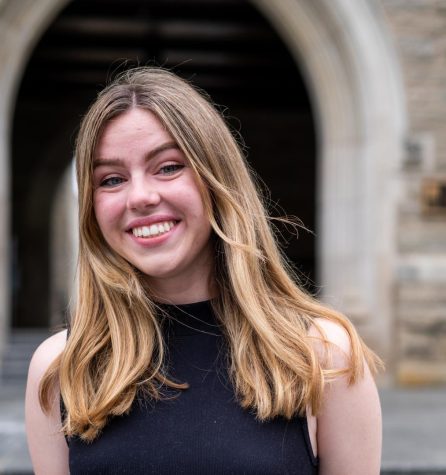University’s Africana Studies Program Hosts “Black Perspectives on the Election” Panel
November 18, 2020
When President-elect Joe Biden and Vice President-elect Kamala Harris were announced the victors of the 2020 presidential election, many people were happy to celebrate in the streets, retire to their homes and give no further thought to politics. However, many still had worries on their minds, acknowledging the vast amount of work left to do. Such were the esteemed panelists of the Africana Studies Program’s “Black Perspectives on the Election,” who shared their opinions on the role of the Black community in modern United States politics via a virtual panel held last Thursday.
Political Science Professor Camille Burge, the event’s host, began the night by giving a brief overview of the election and more specifically the Black community’s role in delivering a Biden-Harris victory. She referenced exit poll data suggesting that over 90% of Black women and 80% of Black men voted for Biden. She also made reference to Biden’s and Harris’s victory speeches.
“Especially at those moments when this campaign was at its lowest ebb, the African American community stood up again for me,” Biden said. “You’ve always had my back, and I’ll have yours.”
Reverend Pamela Lightsey, Vice President of Meadville Lombard Theological Seminary, shared her personal role in standing up for Biden. She described the Black Church PAC, the only political group committed to the Black community’s interests and her reluctance to work with it, given its stance on the LGBTQ+ community, to which Lightsey belongs.
“There are some crises, some evils, some harms that are so horrible, which threaten the survival of entire people, that groups that might not otherwise collaborate find that they are willing to come together for some common cause,” Lightsey said. “Ours was the end of this current administration.”
Lightsey went on to start the Black Political Collective, which advocates for the political interests of the Black community and amassed over 5,000 followers within a three month period.
Jacqueline Rivers, Lecturer in African American Studies at Harvard and Executive Director of the Seymour Institute for Black Church and Policy Studies, argued that it is obvious that the African American community stood up for Biden, but it is doubtful if he will do the same for them. She described Biden’s ascent from achieving fourth and fifth places in early caucuses, like Iowa and New Hampshire, to becoming President-elect.
“It was when they started counting our votes that it started turning around,” Rivers said.
Rivers shared her belief that Biden and the Democratic party as a whole take Black votes for granted, giving them very little in return for their loyalty. She described her reaction to Biden’s proposed economic policy to create thousands of new jobs as laid out on his website.
“How are you going to make sure our children will be prepared for the new jobs?” she asked. “Is there going to be real structural change in terms of racial justice? Where is Joe Biden on reparations?”
She concluded with her belief that the Black community needs to make Democrats earn their vote. Although she does not believe the Republican party offers anything substantial to Black voters, she argued, “With the margins so narrow…we can make Democrats pay just by not turning up [to the polls].”
“We need temporary alliances based on our shared interests,” Rivers said, arguing the Black community should have “no permanent loyalties to either party.”
Margaret Kimberley, Senior Editor at Black Agenda Report and author of “Prejudential: Black America and the Presidents,” shared similar sentiments of Black Americans being trapped in a two-party duopoly, with neither representing their interests.
“The foundational anti-Black racism in this country dictates that one of these parties will be viewed as the white people’s party and the other as the Black people’s party,” Kimberley said. “But even the Black people’s party is loathed to actually act on behalf of their most loyal constituents.”
She emphasized that “now is not a time to breathe a sigh of relief,” highlighting Biden’s problematic history, from voting against school bussing to achieve racial desegregation of schools in the 1970s to bragging about his 1990s crime bill doing “everything but hang people for jaywalking.”
Shealsotoo turned her criticism to Harris, citing her mass incarceration of Black men as California’s Attorney General, calling her the “favor of Wall Street.”
Kimberly closed with a call to action.
“We can’t be concerned about the new President-elect and Vice President-elect,” she said. “They should worry about us and our ability to move in unison…This is not the time for sentiment. Kamala Harris and the President-elect must make good on their words of thanks to Black voters. Talk is cheap. It is up to us to ensure that their words have some meaning.”











